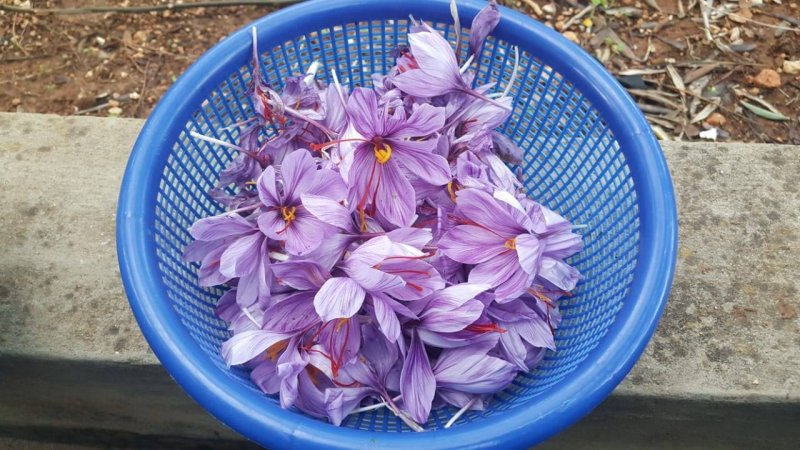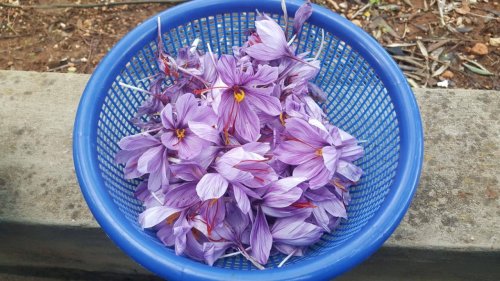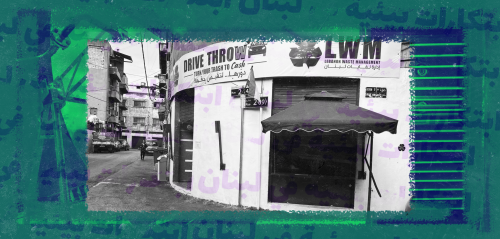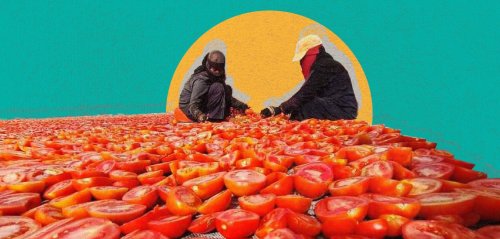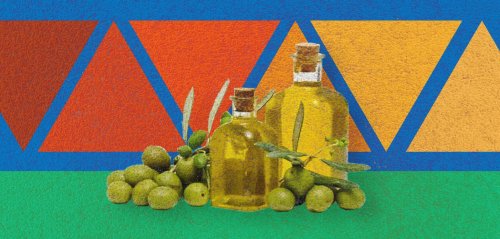After the end of the civil war, Lebanese governments adopted many plans to import agricultural products from abroad, rather than grow them, which are often cheaper than those produced locally.
However, with the economic collapse that has struck Lebanon since 2019, and with the rise in the prices of food and agricultural products, there has been a rising call for a re-examination into the pillars of the Lebanese economy while stressing the importance of returning to agriculture in all its forms, which showed aromatic agriculture as an invaluable presence among these crops.
Their only recourse
Lebanese farmers, or those who wanted to enter the world of agriculture, have resorted to aromatic crops, such as thyme, saffron, lavender, chamomile, and sage, for several reasons, most notably; the ease of sale of the products, and its lack of physical effort compared to most other crops, in addition to their demand in the pharmaceutical, food, and perfume industries, as well as being an important source of bee food and in the manufacture of high-quality honey.
According to Hossein Jaradi, an agricultural specialist, "Saffron cultivation, for example, has a very great impact on farmers, as it is called ‘red gold’ due to its high price. It was a prevalent belief that saffron can only be grown in Iranian land, and this is wrong, as saffron is found in Spain, Morocco, Tunisia, Afghanistan, Pakistan, Russia, China, and many other countries."In agriculture, medicinal and aromatic plants are commonly called “green gold”, as they provide those who produce them with opportunities to earn hand cash.
It was a prevalent belief that saffron can only be grown in Iranian land, and this is wrong, as saffron is found in Spain, Morocco, Tunisia, Afghanistan, Pakistan, Russia, China, and many other countries
Jaradi tells Raseef22 of his experience with this type of agriculture, "Saffron seedlings can withstand multiple climatic conditions, and of course its cultivation has a number of conditions that must be met, but they are not impossible. We conducted an experiment on the Lebanese coast, which is a humid coast, especially in summer, and even though saffron does not tolerate humidity much, it worked and succeeded with great results, as the quality was excellent."
The "Gold in Soil" association in the town of Baysour in the district of Aley prepared for a large campaign to plant thyme seedlings in the mountains of the town. The association's president, Amer Malaeb, tells Raseef22 about "the association being active in the field of aromatic plants for several reasons; the first of which is the transformation of picking thyme, sage and chamomile from nature to a profession for some, which led to the extermination of these plants in the forests, because people uproot their seedlings from the roots, and therefore they cannot be re-germinated the following year."
"We have put forward an alternative project, first to preserve these plants, because we cannot prevent people from going to the forests, as there is a need for this plant. Rather, we follow a counter-step by encouraging the cultivation of thyme and other plants, and we also contribute by securing seedlings for people. The second thing is that these seedlings will become a source of livelihood for families, as the price of a kilo of thyme is at least $8, and this is quite important in the economic cycle for families," he says.
Malaeb believes that the price of thyme seedlings ranges from 2,000 to 3,000 Lebanese pounds, and in practice, it is possible to go into a thyme agricultural venture at a very low price and achieve a large return. We encourage people to enter this realm and there’s a great demand for it. Now we are encouraging the presence of thyme mills in all regions, as well as finding factories to extract thyme oil, which is used in many medical treatments.
The role of the Ministry of Agriculture
Zeina Tamim, head of the Department of Rangelands and Public Gardens at the Ministry of Agriculture, tells Raseef22 that "the Ministry of Agriculture has its own measures towards endangered crops, and sets measures to preserve them from extinction. Thyme, in addition to many aromatic crops, is one of these plants, since people resort to uprooting them from nature in an unregulated manner, which puts them at risk of extinction."
She says, "The role of the ministry here is to give permits for planting them, in order to control the quantity so that the large amounts of produced thyme would be from cultivated seedlings and not from those plucked from nature, and this is how we preserve thyme in nature. Also, the ministry giving a license to pick wild thyme will be aimed at controlling the practice, and the ministry, through its experts, will also help farmers on the methods of planting and harvesting in the correct and effective ways."
According to Tamim, 150 tons of thyme are produced annually from various Lebanese regions. She points out that thyme does not need support or advertising to be sold, as it sells itself, especially since there is a huge demand for Lebanese thyme in Lebanon and abroad, and it is exported as a unique product.
The price of thyme seedlings ranges from 2,000 to 3,000 Lebanese pounds, and in practice, it’s possible to enter a thyme agricultural venture at a very low price and achieve a large return. So who can enter it and what is the role of the Ministry of Agriculture?
She adds, "Thyme does not require much effort in production, and it is fast to produce and gives three harvests per year, of course only if it’s planted correctly, and the seedling gets the right fertilization and continuous follow-up.”
The dangers of aromatic agriculture?
Despite the economic and medical feasibility of aromatic crops and their widespread presence in the Lebanese regions, those in charge of Lebanese agriculture confirm that they do not threaten the rest of the crops, as most traditional crops have become an integral part of the Lebanese agricultural basket, and cannot be easily abandoned.
"The decline in tobacco cultivation in the south during the years of crisis is due to the financial collapse and the high cost of cultivation on farms, and not due to the competition of aromatic crops. Once the price of a kilo of tobacco was corrected, people went back to growing it again, and the cultivated areas are expected to increase next year," Hassan Fakih, head of the tobacco farmers syndicate in the South, tells Raseef22.
Fakih notes that "tobacco has characteristics that protect it from competition, the first of which is its price, which is subsidized by 30% to 40% by the state, because it considers it a factor of resilience for the people in their villages, in addition to the Regie administration, which has developed the local industry and accompanied agriculture, industry, and trade and now provides the state treasury with $500 million annually."
He stresses the importance of having diversity in agriculture and describes it as necessary, along with the need to address water sources to secure water for farmers properly and permanently in order to encourage agriculture, since the diversity of the agricultural basket is of great importance to agriculture and the economy.
In this context, Tamim stresses "the need for the multiplicity of specializations in agriculture and the multiplicity of crop species, in order to preserve all crops and maintain their price so that the locality does not depend on only one crop and neglect the rest, making its price decrease due to its abundance."
The Lebanese people are not consumers of saffron, and in order to create awareness among the Lebanese people for the consumption of saffron, it needs a very long time
Securing markets
If some aromatic crops such as thyme market themselves and do not find obstacles in sale and distribution, others suffer from this problem. Jaradi recounts the experience of the Lebanese army with one of the dioceses, where they planted saffron within 500 dunams, which is a large area. A quantity of about 5 kilograms was produced in the first year, and in the second year the production doubled, but the produce of the first year has not been distributed so far.
He says, "In Lebanon, there is no real market for saffron, as the Lebanese people are not consumers of saffron, and in order to create awareness among the Lebanese people for the consumption of saffron, it needs a very long time, from one to two generations, and the closest market to us for consuming saffron is the Arab Gulf, which depends on Iranian saffron. For example, a Lebanese farmer who has a kilo of saffron — that can be priced from $1,000, and can reach up to $20,000, depending on its quality — stores it in his home but cannot distribute or sell it, and therefore distribution is the problem facing saffron agriculture and its continuity in Lebanon, hence the call for the need to help farmers secure markets abroad to distribute its production.”
Jaradi points out that, "Those who used to say that agriculture is useless in Lebanon are the traders and merchants importing agricultural goods. They tried to convince the Lebanese people that importing is cheaper than agriculture, and even if this is true, it does not mean that the agricultural movement in Lebanon should stop. We must support local production to ensure that it is sold at a good price, and contribute to moving the economic wheel."
Aromatic crops were able to emerge from the underbelly of the crisis in Lebanon. There is an unprecedented demand for them, and everyone agrees on the need to develop them and secure all the requirements for their continued presence while preserving the region’s traditional agriculture, to secure the Lebanese food basket to spare the citizen the scourge of losing agricultural products or increasing their prices under any circumstances.
Raseef22 is a not for profit entity. Our focus is on quality journalism. Every contribution to the NasRaseef membership goes directly towards journalism production. We stand independent, not accepting corporate sponsorships, sponsored content or political funding.
Support our mission to keep Raseef22 available to all readers by clicking here!
Interested in writing with us? Check our pitch process here!
